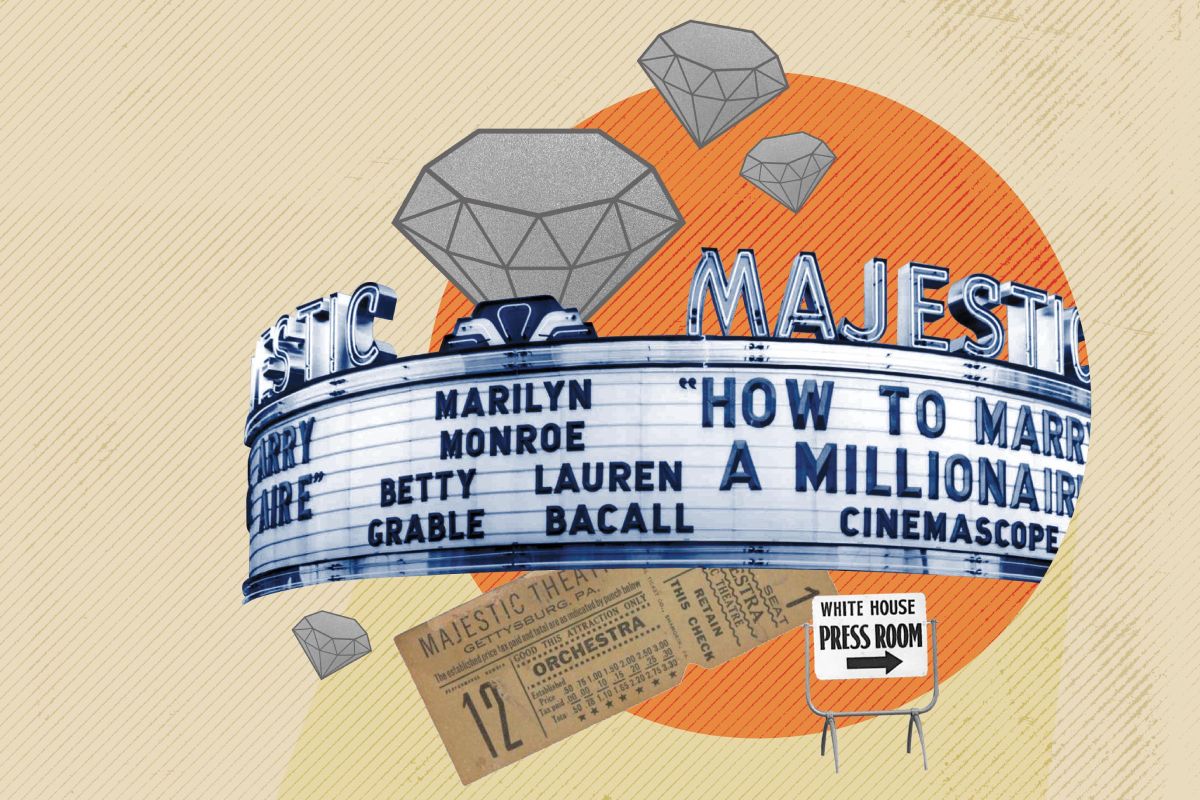
Students, faculty, staff, and families appreciate Gettysburg College’s Majestic Theater as the premier cultural arts center in southcentral Pennsylvania, showing dramas, comedies, love stories, and documentaries. As the Majestic prepares to celebrate its centennial on Nov. 14, 2025, GETTYSBURG College Magazine shines a spotlight on the theater’s past 100 years.
1923
Gettysburg Hotel Manager Henry Scharf attends a town meeting discussing the need for a community hall. According to “A Majestic Presence: A Study of the Development of the Majestic Theater in Gettysburg” by Jay Gallagher, Kelly Burnham, and Nancy Moll, the borough dimmed the lights on the project due to costs.
1924
Scharf resurrects the community center proposal and announces the hotel will fill the vacant lot behind it with a building containing an auditorium, a theater, and several commercial areas.
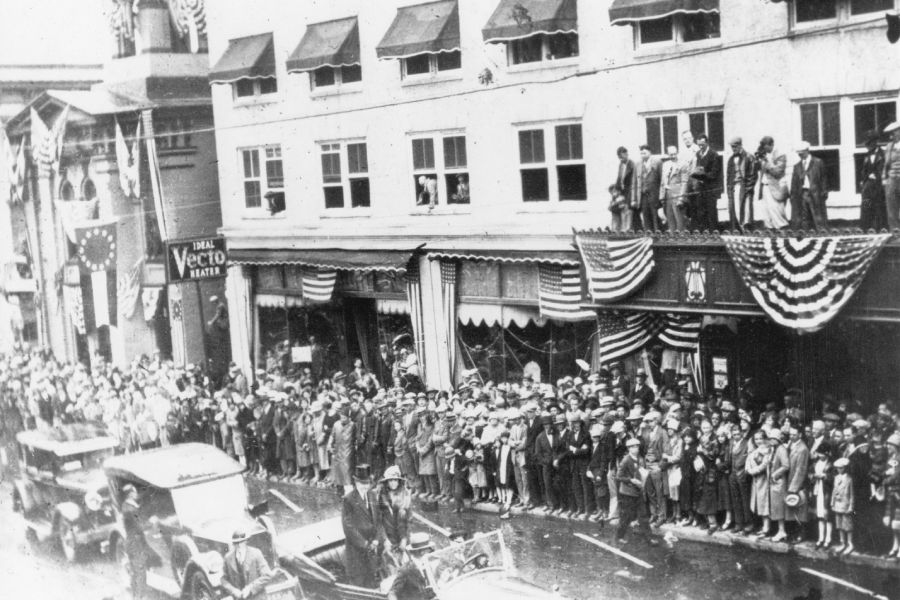
Nov. 14, 1925
Approximately 1,500 people flock to Gettysburg’s Carlisle Street to celebrate the opening of Scharf’s dream, now called the Majestic Theater. Cecil B. DeMille’s 10-reel epic “The Road to Yesterday” plays on screen.
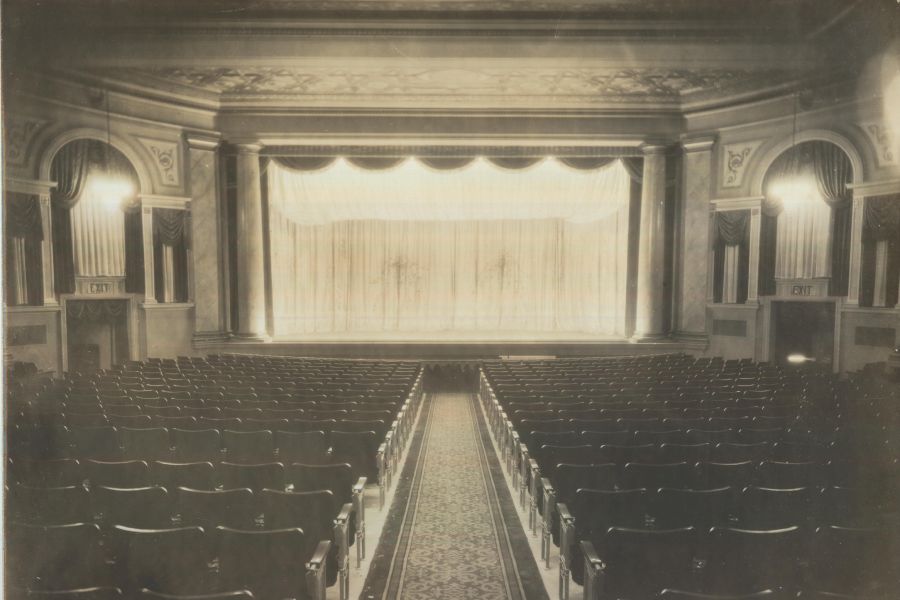
May 30, 1929
The 1929 film “Speakeasy” becomes the first “talking picture” to play at the Majestic Theater. John Wayne, who played a small part in the film, later became one of the icons of Hollywood’s Golden Age.
May 29, 1946
Gen. Dwight D. Eisenhower, Supreme Allied Commander of World War II, speaks to the Gettysburg College graduating class of 1946 on the Majestic’s stage—four years before he and his wife, Mamie, purchase their farm south of town.
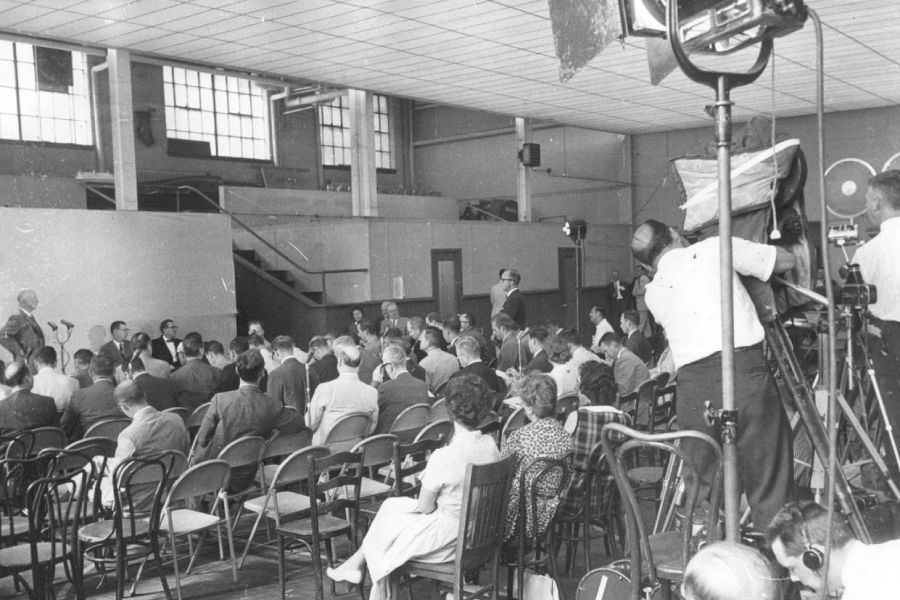
1955-1959
The Majestic’s significance as a major event space extends beyond the Gettysburg community when the ballroom is converted to President Eisenhower’s press room.
According to “Hotel Gettysburg: A Landmark In Our Nation’s History” by Elise Scharf Fox, the Majestic was used primarily to allow former White House press secretary James Hagerty to conduct briefings and provide space for reporters to write stories for wire services and papers.
Aug. 12, 1959
The first presidential press news conference is held in the Majestic Theater.
“Eisenhower, no doubt, was discussing the planned visit of Soviet Premier Nikita Khrushchev to the U.S. scheduled for the latter part of September,” said History Prof. Michael Birkner ’72, P’10. “He was probably also discussing the Berlin crisis that Khrushchev had instigated months before and that Ike was trying to defuse. The world’s eyes were on Gettysburg, and the Majestic press room was a nerve center.”
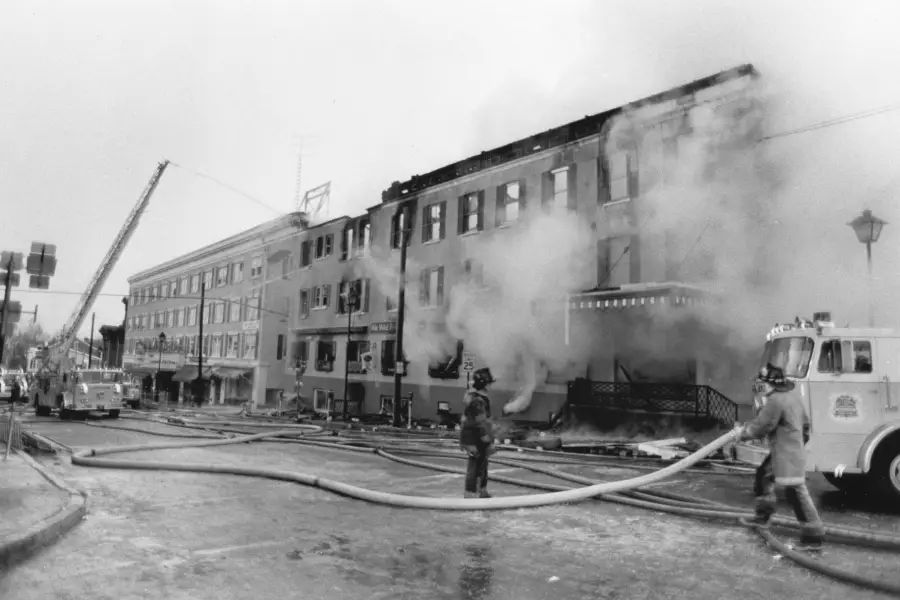
Feb. 10, 1983
Fire destroys the Gettysburg Hotel on a bitterly cold night, but the heroic efforts of volunteer firefighters save the Majestic.
October 1988
Gettysburg College purchases the hotel and theater and begins rebuilding the burned-out hotel.
1997
Gettysburg College President Emeritus Gordon Haaland leads the Commission on the Future. Nine task forces examine various aspects of college life, and the need for a campus cultural arts center becomes apparent.
Haaland charges Suzanne Flynn, his executive assistant, to explore the possibility of evolving the Majestic into this center. At the time, the Majestic’s main auditorium and stage were divided into three small cinemas. The area that now houses a restaurant, the box office, and cinemas was once a warehouse.
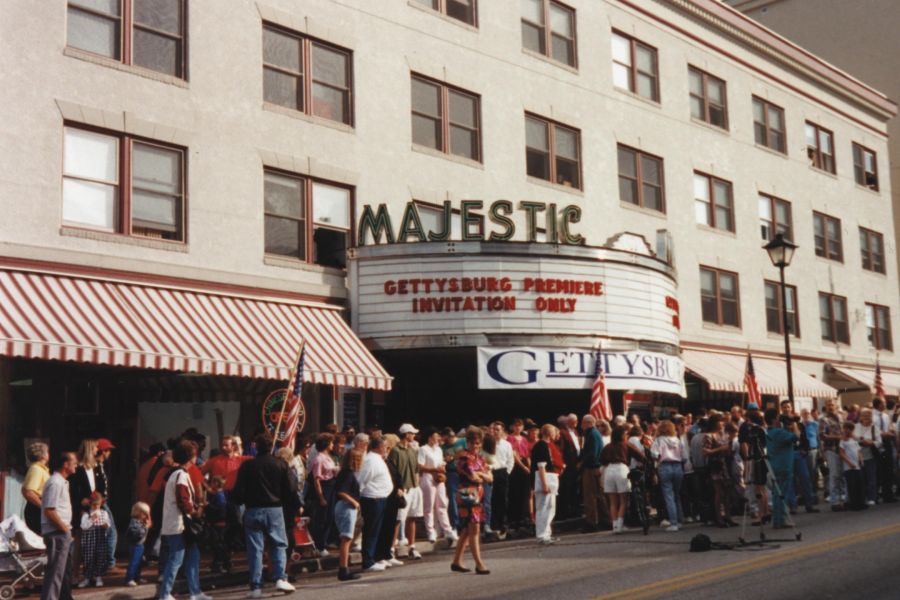
A feasibility study featured one resounding recommendation: “Even if we could renovate the building, we shouldn’t do it unless we had a reason to do it and it would be supported by the College and the community,” recalled Flynn, now a professor emerita of English.
Flynn became the College’s spokesperson for the project, meeting with elected officials and community groups until the arrival of the Majestic’s founding executive director, Jeffrey Gabel, in 2003.
2003
With planning underway, Gettysburg College hires Gabel, who was in his fifth year managing The Music Hall in Portsmouth, New Hampshire.
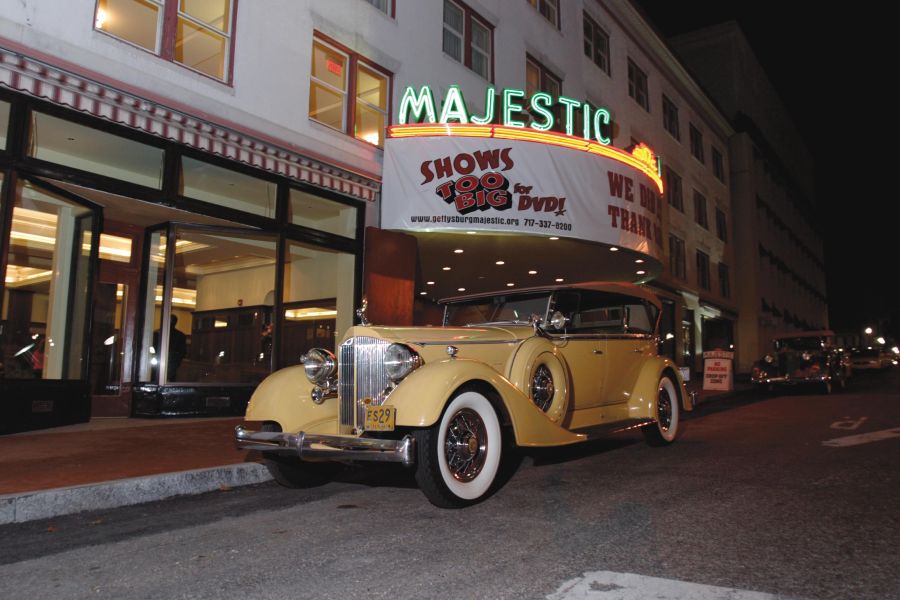
2004
A leadership gift from David LeVan ’68 launched a stunning $16.5 million historic restoration and reinvigoration of the Majestic Theater to once again be a state-of-the-art facility serving the community and welcoming guests from near and far.
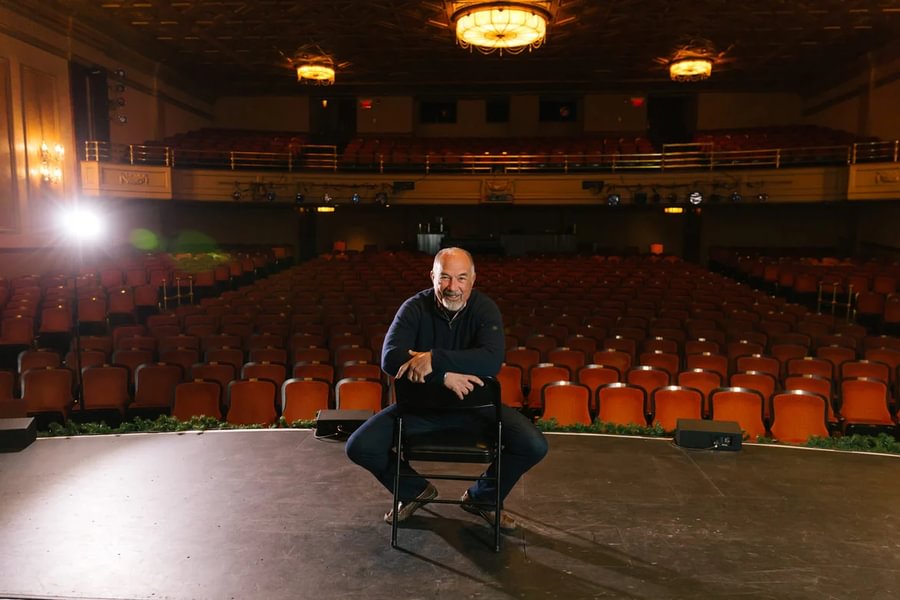
Nov. 14, 2005
The Majestic reopens on the 80th anniversary of its first opening night with a Broadway gala featuring vocalists Elaine Stritch, Marin Mazzie, and Debbie Gravitte. Carson Kressley ’91 and filmmaker Jamie Bernstein served as hosts.
October 2007
Former Pennsylvania Gov. Ed Rendell hosts the Governor’s Arts Awards, with lifetime achievement awards going to Pennsylvania natives Rob Marshall, an Academy Award-winning director, and his sister, Kathleen Marshall, a Tony Award-winning choreographer.
March 2020
The COVID-19 pandemic forces the Majestic to close for 14 months. During the 2020-2021 academic year, the theater serves as social-distanced instructional space for Gettysburg College.
Feb. 10-12, 2023
Gettysburg College hosts “Who Are We?: A Festival Celebrating the Films of Ken Burns.” It welcomes documentary filmmaker Ken Burns, his collaborators, historians, students, and the public for three days of discussions, film showings, and performances.
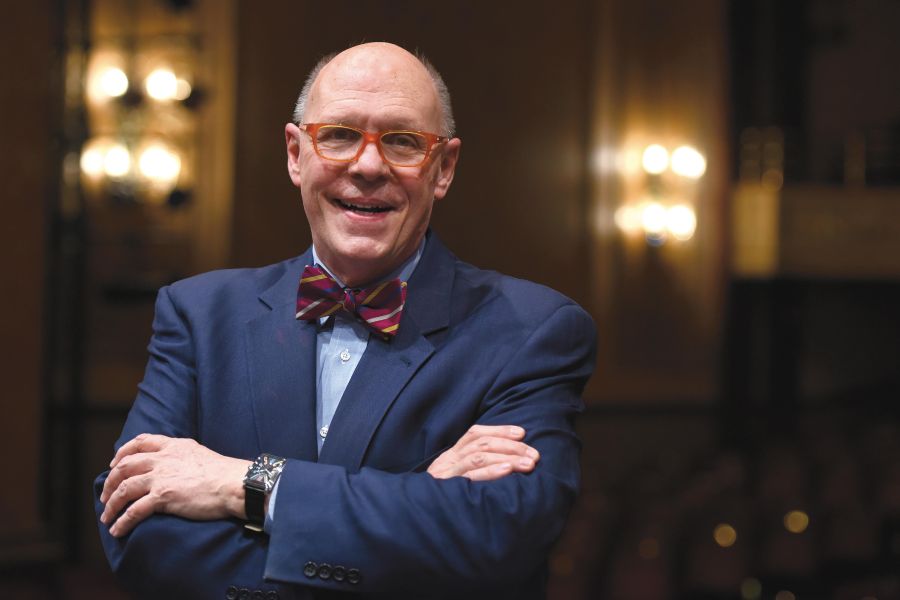

April 2024
Four months after Gabel’s retirement, Gettysburg College announces Brett Messenger as the theater’s new executive director. Messenger previously served as the curatorial director of live arts at the Morris Museum in Morristown, New Jersey.
In his first nine months, Messenger and his team have focused on using the Majestic’s space in new and meaningful ways. Cinema 1 is turned into a flex theater where small live shows can be performed in front of intimate audiences. Gettysburg College students attended a party in the Patron’s Lounge before a showing of the blockbuster movie “Wicked.”
“I want every student of every incoming class to have a bare minimum of two types of interactions with us during their time here—something that is culturally or intellectually stimulating and one that is pure fun,” Messenger said.
In celebration of the Majestic’s 100th anniversary this fall, Messenger is planning a “grand gala” that longtime patrons and newcomers can enjoy. The theater’s coming season will honor its legacy, reflecting on its history and future while recognizing its role as a cultural hub in Gettysburg, Pennsylvania, including for the College’s Sunderman Conservatory of Music.
by Alex J. Hayes
Posted: 08/22/25